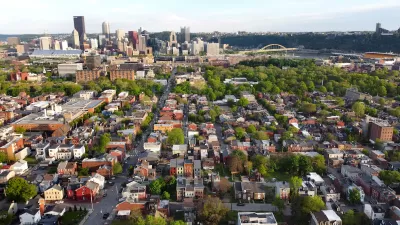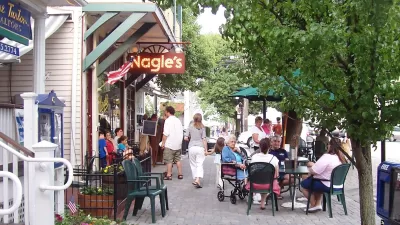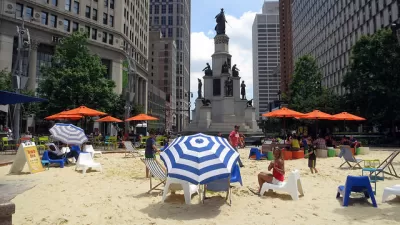Virginia recently announced new rules governing the connectivity and width of streets. Some new urbanists bemoan that they may have muffed an opportunity to make the new standards even better.
"On July 1, Virginia will begin enforcing new standards that require street networks to be better connected and that allow subdivision streets to be significantly narrower than in the past."
"'I think they will have a great impact,' Nicholas Donohue, assistant secretary of transportation, said of the new Secondary Street Acceptance Requirements, which were enacted after 18 months of public consultation and refinement. 'This is one of those common-sense policies that would have improved the traffic situation if it had been in place years ago.'"
"The standards will discourage developments from being built without direct links to adjacent neighborhoods. The commonwealth will use a "connectivity index" to ensure that people have choices of how to get from one place to another. Subdivisions will no longer be built with public streets that provide only one way in and out."
"However, Daniel Slone, a Richmond attorney who specializes in legal issues affecting New Urbanism, says new urbanists let a larger victory slip through their hands."
"'The State conducted a fully open process and encouraged new urbanists to the table,' Slone said. 'Out of that process came a very good proposal. When this went out to public comment, it was largely ignored by new urbanists, but not by the Home Builders [Association of Virginia].' The Home Builders attacked the proposal and succeeded in having it diluted - after which 'the new urbanist experts weighed in,' according to Slone."
"'By then the Home Builders' machine was engaged and we never recovered momentum,' said Slone, who has represented new urbanist developers for 20 years. 'The missing ingredient,' in Slone's view, 'was public support for the more aggressive standard.' New urbanist experts had good arguments to counter the builders, according to Slone, but the builders effectively mobilized public opinion, and 'the weaker arguments prevailed.'"
Thanks to Renee Gayle Brutvan
FULL STORY: Narrower, more connected streets coming to VA

Alabama: Trump Terminates Settlements for Black Communities Harmed By Raw Sewage
Trump deemed the landmark civil rights agreement “illegal DEI and environmental justice policy.”

Planetizen Federal Action Tracker
A weekly monitor of how Trump’s orders and actions are impacting planners and planning in America.

The 120 Year Old Tiny Home Villages That Sheltered San Francisco’s Earthquake Refugees
More than a century ago, San Francisco mobilized to house thousands of residents displaced by the 1906 earthquake. Could their strategy offer a model for the present?

Ken Jennings Launches Transit Web Series
The Jeopardy champ wants you to ride public transit.

BLM To Rescind Public Lands Rule
The change will downgrade conservation, once again putting federal land at risk for mining and other extractive uses.

Indy Neighborhood Group Builds Temporary Multi-Use Path
Community members, aided in part by funding from the city, repurposed a vehicle lane to create a protected bike and pedestrian path for the summer season.
Urban Design for Planners 1: Software Tools
This six-course series explores essential urban design concepts using open source software and equips planners with the tools they need to participate fully in the urban design process.
Planning for Universal Design
Learn the tools for implementing Universal Design in planning regulations.
Clanton & Associates, Inc.
Jessamine County Fiscal Court
Institute for Housing and Urban Development Studies (IHS)
City of Grandview
Harvard GSD Executive Education
Toledo-Lucas County Plan Commissions
Salt Lake City
NYU Wagner Graduate School of Public Service





























